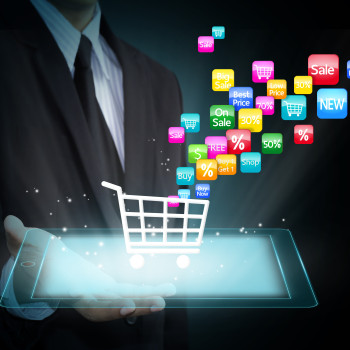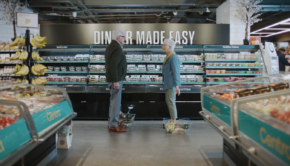Top technology predictions for 2015

What technology trends will impact the retail industry most significantly in 2015? We have asked experts from the top retail and technology providers in the country to give us the low-down on what you’ll need to know in order to stay abreast of ever changing technology and keep one step ahead of the consumer at all times
11 February 2015
Are you ready for iBeacons, Mobile POS and cloud based IT solutions? Technology is growing at a phenomenal rate and from a retail perspective if you have the right technology in place, it can make you a lot of money and save you a lot of time. New technologies are about disrupting a shopper’s regular flow in order for them to make additional impulse purchases or to enable them to redeem promotions instantaneously. However using new technologies wisely is very important too so retailers need to know how to get the best out of them without overstepping the mark and invading a shopper’s privacy.
Londis continues to lead the way in IT
 Chris Donnelly, head of IT, ADM Londis speaks to ShelfLife about his thoughts on what technologies will become most prevalent in the year ahead
Chris Donnelly, head of IT, ADM Londis speaks to ShelfLife about his thoughts on what technologies will become most prevalent in the year ahead
While 2015 might not see the iBeacon proliferate throughout retail, I believe it will see a host of real world applications being piloted.
We are all keenly aware of the increasing importance of mobile in the customer conversation. We are comfortable with loyalty schemes and how they can help drive footfall and spend and in the retail trade we are no strangers to big data and analytics. I believe however that these are all simply components of the next retail revolution which will unfold via iBeacons and other location based technologies.
Whereas many loyalty schemes generate an action on the next visit, iBeacons can generate that action on this visit. In an increasingly online world, counterintuitively, consumers wish to be treated more individually than ever before and companies are under increasing pressure to give consumers more of what they want, when and where they want it. All the time respecting the boundaries, and ‘not being creepy’.
iBeacons will also play a hugely significant role in category management, allowing for real time analysis of dwell time and navigation patterns throughout the store. This may considerably impact store layout and design decisions for retail brands.
iBeacons will also play a hugely significant role in category management, allowing for real time analysis of dwell time and navigation patterns throughout the store.
The traditional ‘hourly sales report’, which shows takings, has long been the primary means of determining staffing levels, however, whilst payment is the last point of the consumer journey, the application of iBeacon technology will highlight the hot spots throughout the store, the deli queue time and much more – giving retailers much richer data than can be gathered from the standard hourly sales report.
The ability to prompt relevant offers and to remind consumers of regular purchases, right at the point of purchase will all add to the consumer experience.
The technology is cheap and easy to deploy, and similar to how Tesco first interpreted loyalty data and stole a march on the industry, insightful application of iBeacon Technology will be game changing to first movers. With iBeacons, the shop floor becomes the launch pad, not the end zone.
The use for iBeacon Technology is widespread and while 2015 may not be the year we see widespread adoption, I believe that any retailer who ignores this technology will be at a disadvantage in the future.
CBE pioneers technology in the retail industry
CBE has a proven track record in developing solutions for retailers to handle the complexities of the supermarket, convenience, forecourt and hospitality sectors. Seamus McHugh, marketing manager of CBE talks about what technology trend will impact the retail industry most significantly in 2015 and why?
Managing queues and improving checkout speeds at peak periods is a major challenge for all retailers. Traditionally most stores would have increased the number of EPOS units to handle such spikes in trade but as retailers continue to reduce costs and maximise floor space with merchandised products this is no longer an option.
A unique solution to combat this dilemma is the introduction of the Mobile POS (MPOS). The Mobile POS can simply be rolled out as required and removed when the queues dissipate. The MPOS devices use the same software as the normal EPOS system and as such have access to the product file and promotions and all sales are synced to the reporting suite in the back office. MPOS units do not require checkouts and as such only cover a small area of the store and can be located at a convenient area within the shop.
CBE trialled Mobile POS in early 2014 and has since implemented the solution in a number of convenience stores in the UK. The system has been warmly welcomed by both the retailers and customers alike.
The Mobile POS can simply be rolled out as required and removed when the queues dissipate
Self-Checkout (SCO) can also be implemented to manage increased sales at peak periods. With one operator able to monitor up to four stations it is an invaluable way of opening new checkouts without the need to increase cashier costs. SCO can also be utilised during early morning or late evening shifts when the store normally operates on a skeleton staff. The self-checkout units can handle the customer’s transactions allowing staff to complete other tasks such as checking deliveries in the morning or doing the newspaper returns in the evening.
With self-checkout adoption rising in other countries, many retailers in the convenience sector are now looking at ways of adopting it in their stores. The main reasons for this are to cope with consumer demand, address queuing issues at peak periods and to offer an improved customer experience.
To speak with a CBE representative call 1890 373000, email sales@cbe.ie or visit www.cbe.ie.
Retail Solutions up in the cloud
 Combining cutting edge retail software and hardware solutions with excellent customer service, Retail Solutions has been a leading EPOS systems provider since 1995. Jarlath Hennelly, general manager of Retail Solutions gives his thoughts on IT innovations that will come to the fore this year
Combining cutting edge retail software and hardware solutions with excellent customer service, Retail Solutions has been a leading EPOS systems provider since 1995. Jarlath Hennelly, general manager of Retail Solutions gives his thoughts on IT innovations that will come to the fore this year
We think 2015 is the year when cloud based point of sale technology comes more to the fore. As our technical infrastructure improves, the ability to run applications based in the cloud will become more and more accessible to more retailers. The big advantage of this is data access, where a store manager or owner can easily and readily access live sales data on the phone or tablet from anywhere in the world. This allows you to manage your business on the move, where you can have full control over your stock and customer information while travelling at home or abroad.
It also has the added benefit of cost saving for the retailer. Traditionally, POS systems are sold on per license fee per device and then a yearly maintenance fee. The problem with this model is that if the retailer is unhappy or dissatisfied after a month, they could be out the full cost upfront. Cloud based technology is based more on the Software as a Service (SaaS) pricing model in that the retailer pays a monthly fee only and nothing upfront. If you are not totally satisfied, you can cancel at any time. These monthly fees normally cover software, support, backups and future upgrades, which can be done remotely without any downtime or management costs to your business. This is a significant productivity advantage over traditional systems. The cloud based server also eliminates concerns about running out of space, or having to upgrade hardware as you increase your customer or stock data on your system. This also leads to a great reduction in the risk of data loss through corruption and virus attacks as everything is being stored and backed up online. The cost of having to reinstall system drivers or traditional systems and the loss of revenue during a downtime due to hardware failure or virus attack can all be avoided.
Cloud based technology is based more on the Software as a Service (SaaS) pricing model in that the retailer pays a monthly fee only and nothing upfront
BWG looks into its crystal ball
Seán Dennison, head of IT for BWG Foods says that sometimes we need to anticipate what our customers want before they even know themselves!
“If I had asked people what they wanted, they would have said faster horses.” Henry Ford was right. Sometimes we have to anticipate what our customers will benefit from before they know themselves. There are many technological solutions in the retail sphere looking for a problem to solve and inevitably some of them will find one in 2015. Many previous years’ emerging technologies are now bearing fruit: the benefits of self-check-out for suitably sized stores are well established; loyalty systems have moved beyond delayed gratification and become more consumer-friendly through instant rewards; and voice recognition is conferring significant benefits in logistics. At BWG, these technologies are positively affecting both the retail and wholesale parts of our business. Some of our larger EuroSpar supermarkets have launched self-service check-outs, loyalty schemes are now commonplace across our branded retail estate, voice-guided receiving and picking has been implemented in our National Distribution Centre and RF receiving and picking is being rolled out to our Value Centre cash and carry outlets.
The technologies which really benefit BWG retailers are those that free them from the mundane back office processes and allow them to spend more time dealing directly with customers
Retailers are demanding a similar experience from consumer mobile devices and applications when using business technologies so it is likely that we will see more of these features (such as natural language user interfaces like Siri) transition to the business arena. At BWG, our eOrder business-to-business online ordering system is benefiting from the feature-rich functionality of consumer on-line shopping systems and our retailers across the Spar, EuroSpar, Mace and XL networks want to see more of this and the application of the latest mobile technologies to our extranets. Consequently, this will be high on our agenda in 2015.
The technologies which really benefit BWG retailers are those that free them from the mundane back office processes and allow them to spend more time dealing directly with customers. Better data quality leads to fewer errors and corrections, integration between the systems of trading partners reduces friction in the supply chain and analytics and business intelligence can provide the insight to manage stock, control prices and improve margins. BWG is actively working with suppliers and retailers to fulfil the promise of these older technologies in 2015 – some of which have been around since Henry Ford’s time.



 Print
Print








Fans 0
Followers